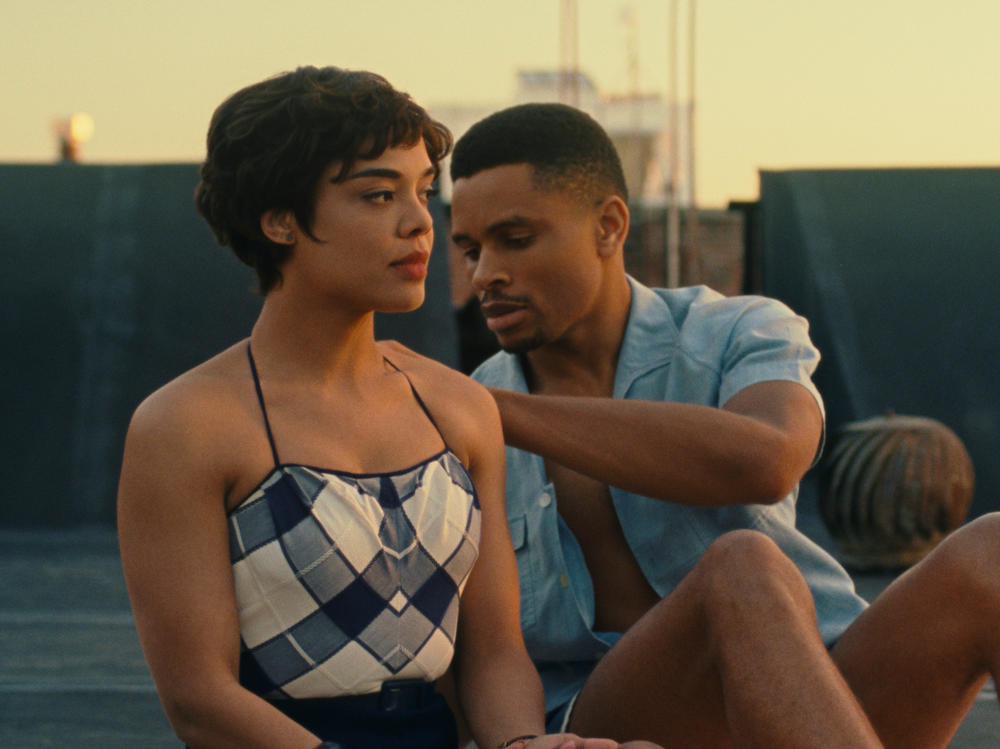Section Branding
Header Content
Let 'Sylvie's Love' Wrap You In All Its Goodness
Primary Content
There are films that invite the viewer in by emanating an energy so lush and warm that you long to continue living in that world even after the runtime has ended. I get this feeling whenever I watch one of Douglas Sirk's 1950s melodramas that, despite holding up a mirror to serious themes like racism, classism and Puritanical social mores, offer a kind of comfort and splendor in their Technicolor richness and grounded translations of mid-century American pathos.
That same energy radiates through Eugene Ashe's Sylvie's Love, a stylishly moody period drama riffing on love and desire both romantic and professional. In the steamy New York summer of 1957, Sylvie (Tessa Thompson) is a young woman from a well-to-do family with dreams of working in television; for the time being, she's helping her dad Herbert (Lance Reddick) look after their family-owned record shop. When the talented saxophonist Robert (Nnamdi Asomugha) drops in one day to inquire with Sylvie about the help wanted sign in their window, the attraction between these two impossibly beautiful human beings is instant.
Once Robert begins working at the shop, their coy flirtations ignite a slow burn of revelations around their mutual interests in music, and one another. She recommends jazz records he hasn't yet heard; he invites her to hear him play a gig. In one scene they find themselves locked in the shop's basement and after a few minutes of intimate conversation, Robert suddenly leans in as if he is going to kiss her – Because why wouldn't he? The moment is perfect for it – but he reaches behind her ear for a bobby pin he can use to pick the lock. The clever fake-out only builds the anticipation for when they finally acknowledge their feelings. Sylvie's Love is full of these small, tender moments.
Naturally, there are obstacles circling their meet-cute. For one, Sylvie has a fiancé, Lacy (Alano Miller), who is overseas serving in the Korean War. And then there's the age-old barrier of one's lot in life – whereas she comes from a world of cotillions and housewives, Robert's barely scraping by playing nightclubs in an up-and-coming jazz quartet helmed by an arrogant bandleader. But they fall for each other anyway, not-so-secretly cavorting around the city, despite her mother's disapproval of Sylvie getting involved with a man "beneath [her] station." For weeks, theirs is a romance that cannot be tamped down.
Until it is – due in part to all of those aforementioned conundrums as well as more considered and thoughtful character motivations better left unsaid here. As the second and third acts of Sylvie's Love unfold, their paths diverge and a few years amble by before they see one another again. And when they do, they are in different stages of their careers and personal lives.
Part of the beauty of Ashe's storytelling lies in the attention given to their interests outside of the relationship. Robert and Sylvie stand on their own as drawn-in figures, him struggling to adapt to a changing musical landscape, her juggling the expectations of being a mother and housewife while working as an assistant to a black woman TV producer on a cooking show. From afar and up close, they are encouraging of each other's passions, even as they know those pursuits hinder their chances of being together for good.
Aesthetically, the beauty is in the evocation of the era's cinematic look, with cinematography by Declan Quinn – this glistening New York City was filmed on a Warner Bros. backlot and looks it, that's the point. It's New York as 1950s-'60s Hollywood often imagined it; hardly dirty, hardly crowded, sleek and elegant. Dreamlike. The costumes, designed by Phoenix Mellow, are drool-worthy, inspired by the styles of the likes of Audrey Hepburn and Sidney Poitier, and featuring a gorgeous Chanel gown.
While watching Sylvie and Robert's dynamic evolve and morph in the ways relationships so often do, I thought about how similar it felt to the 1961 movie Paris Blues, starring Poitier and Paul Newman as jazz musicians living in Paris who fall for a couple of vacationing American women played by Diahann Carroll and Joanne Woodward. Their respective romances are complicated by the misalignment of their individual wants out of life –activism vs. passivity, family vs. career – and much of the film finds each of the couples burrowed deep in existential and intellectual conversations that make it difficult to imagine how they might make it work.
In fact, Ashe has named Paris Blues and the Harold Flender novel it is based upon as a reference point in the making of Sylvie's Love, and he hews more closely to the book, which apparently centers the black couple instead of making them secondary players as the film did. It works – not unlike filmmaker Todd Haynes explicitly borrowing from the Douglas Sirk palate to update and reimagine the melodrama of the 1950s, so does Ashe successfully echo Paris Blues, Sirk and other films of that time to offer up a refreshing take on quiet romantic storytelling.
It's the kind of movie one wishes Poitier and Carroll had the opportunity to make together at the height of their careers. Thankfully – and in no small part because of Poitier's and Carroll's contributions to the art and industry – a movie like Sylvie's Love can and does exist now.
Copyright 2020 NPR. To see more, visit https://www.npr.org.
Bottom Content




